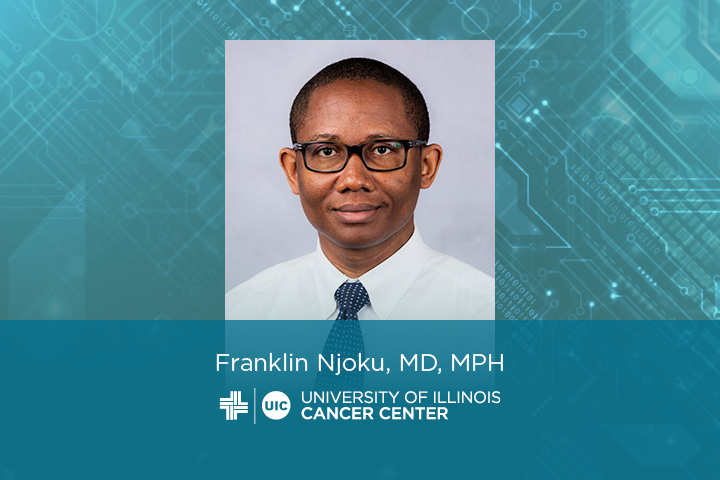
Franklin Njoku, an internist in UI Health’s Sickle Cell Program, has become a member of the University of Illinois Cancer Center, joining the organization’s Translational Oncology program.
Njoku, MD, MPH, assistant professor at the University of Illinois College of Medicine’s hematology/oncology department, specializes in treating patients with sickle cell disease. His interest lies with treatment of pain caused by the malady, studying the epigenetic modifications to the disease, and cancer risk in individuals living with the disease.
Sickle cell disease is the most common inherited blood disorder in the United States, affecting an estimated 100,000 Americans. It is expected to occur in one in 365 African Americans and one in 16,300 Hispanic Americans. It affects millions of people worldwide and appears more often among people in sub-Saharan Africa; Spanish-speaking regions in the Western Hemisphere (South America, the Caribbean, and Central America); Saudi Arabia; India; and Mediterranean countries such as Turkey, Greece and Italy.
A native of Nigeria, Njoku has been a sub-investigator on numerous local, as well as multicentered, Phase I, II and III drug trials involving sickle cell disease. In a recent study conducted with Dr. Robert Molokie, clinical associate professor at the UI College of Medicine and member of the UI Cancer Center’s Translational Oncology program, Njoku wanted to learn more about how sickle cell disease patients tolerated treatments for various malignancies such as cancer.
“With improved understanding and treatment of sickle cell disease, patients are living into their 60s, and possibly longer,” Njoku said. “Previous studies found conflicting data regarding the incidence of cancer in sickle cell disease. Some studies showed an increased risk of hematologic malignancies or solid tumors, while others demonstrated a decreased propensity for cancers in patients with sickle cell disease.
“We know that delays in treatment and dose reductions can adversely affect response and survival outcomes, but little is known about the ability of sickle cell disease patients to tolerate treatment for various malignancies, and that’s what we are working to find out.”
Njoku received a Bachelor of Medicine, Bachelor of Surgery degree from the University of Nigeria College of Medicine in Enugu, Nigeria. He also received a Master of Public Health degree from the University of Alabama at Birmingham, and completed an internal medicine residency at Chicago’s Cook County Hospital. Njoku was a Fellow in the University of Illinois College of Medicine’s Geriatric Medicine program.
Njoku said he is excited to become a member of the UI Cancer Center, as “it will open up access to multiple shared resources that will be important in carrying out my work.”
